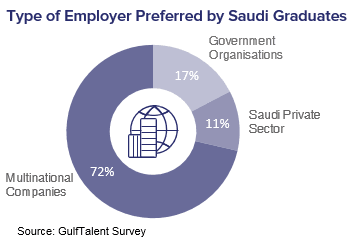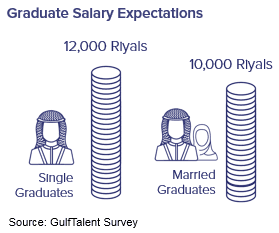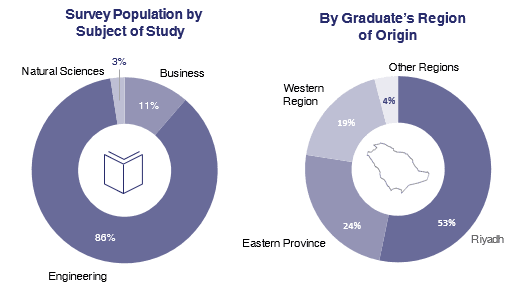Aramco and SABIC top the list of most popular employers for Saudi graduates
Posted on November 29, 2016
Good training, challenging work and attractive salary are key factors influencing graduates’ employment choices
KFUPM graduates on average expect a starting salary of 12,000 Riyals per month
Saudi Aramco has once again been voted the employer of choice for Saudi male graduates, followed by SABIC in second place, according to a survey of KFUPM graduates released by GulfTalent.
Over 200 final-year students and recent graduates of King Fahd University of Petroleum & Minerals participated in the survey.
Oil services company Schlumberger, coming in third place, was the most popular multinational employer. The company has had a consistently high ranking in GulfTalent’s surveys of KFUPM graduates since 2005.
Commenting on the survey findings, Hatem Soliman, Schlumberger’s President for Middle East & Asia, attributed his company’s success in attracting top Saudi graduates to its “commitment to the recruitment and career development of Saudi nationals”.
Also ranking in this year’s top 5 most popular employers were industrial conglomerate GE, and Saudi Electricity Company.
Top 20 Most Popular Employers for Saudi Graduates |
|
|
|
| Source: GulfTalent Survey of KFUPM Graduates | |
Overall, oil and gas companies occupied 5 of the top 20 spots, reflecting the continued popularity of the sector among KFUPM graduates, despite the collapse in oil prices and the resulting fall in hiring activity.
Unlike previous years, however, none of the banks made it to the top 20 list this year, with some graduates citing lack of job security in banking as a concern. The variation of rankings over the years can be found in the full report.
Key Attraction Factors
GulfTalent’s survey asked graduates about the factors that drove them to choose their preferred employer. The top three factors mentioned were the quality of the training and development programme, the opportunity to do interesting and challenging work, and good salary and benefits. Job security and company brand and reputation were also cited as important factors.

Over half the graduates expressed interest in gaining experience working outside Saudi Arabia, with the most popular foreign destination being the USA, followed by the UAE and Qatar.
This was a key factor in making multinationals the favoured group among 72% of graduates surveyed. Other factors were the interesting nature of the work and good training offered by multinationals firms.
Only 17% of graduate respondents favoured joining government organisations. The recent reduction in public sector wages, which occurred after GulfTalent’s survey was conducted, is likely to have reduced this interest even further. Survey respondents who chose government sector reported placing relatively higher value on company reputation, job security and attractive salary.

Interestingly, many graduates who mentioned they would like to work for multinationals still named government-owned Aramco and SABIC among their choices. Some justified this by stating that the pair were not typical government firms and ‘behaved like multinationals’, particularly in terms of training and international exposure.
Hamad, an Industrial Engineering graduate who named Aramco as his first choice, told GulfTalent interviewers “The training you get with Aramco is excellent. And I also like the fact that they have many international partnerships and send you on projects abroad”.
In terms of compensation, the survey found median starting salary expectation of KFUPM graduates to be 12,000 Riyals per month. This represents a 50% increase since 2005, compared with a 55% increase in cost of living over the same period, as per the official inflation data from SAMA, the Saudi central bank.
Impact of Marital Status
Around one-third of survey respondents were already married. Compared to single graduates, married graduates surveyed placed higher value on salary, work-life balance and having a clear path of progression. As a result, 26% opted for government firms.
Single graduates appear to have higher success in securing jobs – with 38% of them holding a job offer by the time they graduate, compared with 23% of married graduates. Some employers mentioned they found it easier to hire unmarried graduates, as they could more easily relocate.
Perhaps as a result of this, the median salary expectation of married graduates appears to be lower, at 10,000 Riyals compared with 12,000 Riyals for single graduates. The median age of respondents is 23 and 24 for single and married graduates respectively.

Additional information and insights about employment preferences of Saudi graduates can be found in the full report.
Survey Methodology
GulfTalent’s study was based on a survey of 224 recent graduates and final-year students from King Fahd University of Petroleum & Minerals (KFUPM). The survey was conducted during June-July 2016, after the publication of the Saudi Vision 2030, but prior to the announcement of pay cuts for the Saudi public sector.
For ranking employers, each survey participant was asked to name their top 3 choices, without being presented with a pre-compiled list to choose from. Employers were ranked based on the number of votes they received. All survey respondents were male, and their average age was 23.



